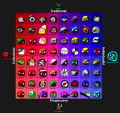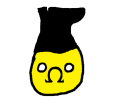Script error: No such module "Mbox".
Social Anarchism is an ![]() Anarchist, economically left-wing and generally culturally progressive ideology.
Anarchist, economically left-wing and generally culturally progressive ideology.
He believes in a stateless, classless society based on the principles of free-association, mutual aid and social equality. To SocAns, the commune is the cornerstone of social organization, where all participants can vote in a direct democracy.
He strongly advocates for a decentralized co-operative economic system centered around worker's self-management, in which trade unions and worker's cooperatives have democratic control over the economy.
Much like ![]() AnCom, SocAn believes in the abolition of unjust hierarchies from state control to private capital, arguing that as long as structures of political and economic oppression continue to exist, individual freedom will never be realized in full.
AnCom, SocAn believes in the abolition of unjust hierarchies from state control to private capital, arguing that as long as structures of political and economic oppression continue to exist, individual freedom will never be realized in full.
Political principles
Social anarchism is opposed to all forms of social and political power, hierarchy and oppression, including (but not limited to) the State and capitalism. Social anarchism therefore sees liberty as interconnected with social equality, and considers the maximization of one to be necessary for the maximization of the other.
Social anarchism envisions the overthrow of capitalism and the state in a social revolution, which would establish a federal society of voluntary associations and local communities, based on a network of mutual aid.
The key principles that form the core of social anarchism include anti-capitalism, anti-statism and prefigurative politics.
Anti-capitalism
As an anti-capitalist ideology, social anarchism is opposed to the dominant expressions of capitalism, including the expansion of transnational corporations through globalization. It comprises one of the main forms of socialism, alongside utopian socialism, democratic socialism and authoritarian socialism. Social anarchism rejects private property, particularly private ownership of the means of production, as the principal source of social inequality.
While social anarchism has rejected the statism of Orthodox Marxism, it has also drawn from Marxist critiques of capitalism, particularly Marx's theory of alienation. Social anarchists have also been reluctant to adopt the Marxist centring of the proletariat as revolutionary agents, instead identifying the revolutionary potential of the socially excluded segments of society.
Anti-statism
As an anti-statist ideology, social anarchism opposes the concentration of power in the form of a State. To social anarchists, the state is a type of coercive hierarchy designed to enforce private property and to limit individual self-development. Social anarchists reject both centralised and limited forms of government, instead upholding social collaboration as a means to achieve a spontaneous order, without any social contract supplanting social relations. Social anarchists believe that the abolition of the state will lead to greater "freedom, flourishing and fairness".
In the place of a state structure, social anarchists desire anarchy, which can be defined as a society without government. Social anarchists oppose the use of a state structure to achieve their goals of a stateless and classless society, as they consider statism to be an inherently corrupting influence. They thus have criticised the Marxist conception of the "dictatorship of the proletariat", which they consider to be elitist, and have rejected the possibility of a "withering away of the state".
However, some social anarchists such as Noam Chomsky sometimes hold state hierarchy to be preferable to economic hierarchy, and thus lend their support to welfare state programs like universal health care that can improve people's material conditions.
Self-organization
Social anarchism promotes self-organization and the cultivation of a participatory culture, encouraging individuals to "do things for themselves". Social anarchism upholds direct action as a means for people to themselves resist oppression, without subordinating their own agency to democratic representatives or revolutionary vanguards. Social anarchists thus reject the political party model of organization, instead preferring forms of flat organization without any fixed leadership.
Personality and Behaviour
Usually portrayed as a less radical version of ![]() Anarcho-Communism.
Anarcho-Communism.
How to Draw

- Draw a ball
- Fill it in black
- Draw 8 red circles connected in the middle
- Add the eyes, and you're done!
| Color Name | HEX | RGB | |
|---|---|---|---|
| Black | #141414 | 20, 20, 20 | |
| Red | #FF0000 | 255, 0, 0 | |
Relationships
Friends
 Libertarian Socialism - My more moderate friend.
Libertarian Socialism - My more moderate friend. Anarcho-Communism - My more radical and most famous brother. Kropotkin is the best!
Anarcho-Communism - My more radical and most famous brother. Kropotkin is the best! Anarcho-Syndicalism - Stronger together!
Anarcho-Syndicalism - Stronger together! Mutualism - Thanks for starting this whole thing.
Mutualism - Thanks for starting this whole thing. Anarcho-Collectivism - You might be a bit controversial at times, but I still like you.
Anarcho-Collectivism - You might be a bit controversial at times, but I still like you. Platformism - Gotta create the conditions for the revolution.
Platformism - Gotta create the conditions for the revolution. Gift Economy - We're very much alike.
Gift Economy - We're very much alike. Libertarian Municipalism - Nice job owning those lifestylists! Social Anarchy for life!
Libertarian Municipalism - Nice job owning those lifestylists! Social Anarchy for life!
Frenemies
 Anarcho-Capitalism - Fellow state hater, but cringe defender of capitalism.
Anarcho-Capitalism - Fellow state hater, but cringe defender of capitalism. Libertarian Social Democracy - Misguided anti-authoritarian folk.
Libertarian Social Democracy - Misguided anti-authoritarian folk.
Enemies
 Pinochetism - You're kinda mean, you know?
Pinochetism - You're kinda mean, you know? National Capitalism - This is literally hell on Earth.
National Capitalism - This is literally hell on Earth. Social Democracy - Statist and capitalist defender? Cringe! Also, I wish people would stop thinking that I am you, but anarchist!
Social Democracy - Statist and capitalist defender? Cringe! Also, I wish people would stop thinking that I am you, but anarchist!
Further Information
Articles
Literature
- Anarchism: Its Philosophy and Ideal by Peter Kropotkin
- Modern Science and Anarchism by Peter Kropotkin
- Cybernetics, Anarchism and Self-Organisation by John Duda
- Demanding the Impossible: A History of Anarchism by Peter H. Marshall
- Social Anarchism or Lifestyle Anarchism: An Unbridgeable Chasm by Murray Bookchin
- Post-Scarcity Anarchism by Murray Bookchin
- The Ecology of Freedom by Murray Bookchin
- A People's History of the United States by Howard Zinn
- Debt: The first 5,000 years by David Graeber
Videos
Wikipedia
- Social Anarchism
- Mutual Aid
- Workers' Self-Management
- Social Ownership
- Inclusive Democracy
- Participatory Economics
Gallery
-
Credit:
 TheLegend2T, Source
TheLegend2T, Source
-
-
-
Verminism / Supremism alt design



